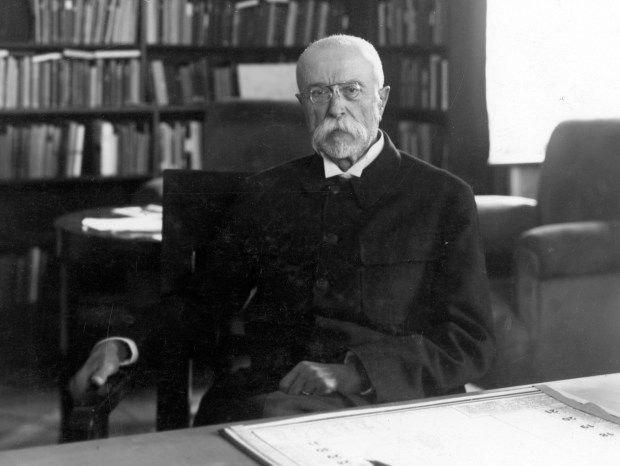In the final days of this deeply contested campaign, I am reminded of an epic political event in Chicago that has been all but forgotten.
It was 1918, at the end of a World War that transformed European nations and ended the old Habsburg Empire that had ruled most of Central Europe. One of the leaders to emerge from those ruins was Tomas Garrigue Masaryk, who became the first president of the new Czecho-Slovak Republic in November 1918. Earlier that year, Masaryk visited Chicago to make the case for a free and democratic Czech state and was greeted on Michigan Avenue by hundreds of thousands of Americans of Slavic descent, who applauded his defense of liberty and freedom.
The democratic values that Masaryk stood for are as relevant to our current election as they were in 1918. They form part of the reason I would argue that for all Americans, this is an election in which America’s international leadership should be of paramount importance.
Why is this the case?
As a historian of the lands and peoples of the Habsburg Empire, I confess that the underlying issues of this election call to mind that empire’s deep divisions among classes, ethnicities, religions and regions, where a powerful government was forced to navigate complex internal and international conflicts in halting and impulsive ways. In the Habsburg state before World War I, a multinational state that included people who identified as Austrian Germans, Czechs, Poles, Slovaks, Hungarians, Romanians, Ukrainians, Italians, Croats and Slovenes, the frustrations of and rivalries among voters and rival ethnic groups distracted leaders from the central, unifying priorities that should have directed responsible policy. The results were not conducive to global peace, economic prosperity or the maintenance of Habsburg power in the international system. Quite the opposite, in fact, as the catastrophe of 1918 proved, when the empire collapsed, and multiple new national states were born, including Czechoslovakia, Poland, Austria and Hungary.
I recently had an opportunity to introduce the current president of the Czech Republic, Petr Pavel, at a ceremony near the University of Chicago campus honoring the memory of Masaryk. The ceremony took place in front of a huge equestrian statute that memorializes Masaryk in the form of the legendary medieval knights of Blanik Mountain in Bohemia, who stand ready to awake and ride forth with St. Wenceslas at their head to save their people from those who would oppress them.
Masaryk’s world has shaped our world, for the ideas of nationalism and national emancipation, for which he so eloquently argued, shaped the division of Europe following the First World War. And they continue to inform the aspirations and hopes, as well as fears and resentments, of European and non-European peoples alike. And yet, ironically, we know how fragile Masaryk’s accomplishment proved to be, for the very republic that Masaryk constructed in 1918 — using liberalism and humanitarianism as the basis for his nationalism, was subverted twice, first by the Nazis in 1938 and then by the Soviet Union in 1948. Happily, in the democratic Europe of today, Masaryk’s confidence that national integrity and national identity would lead to a greater, pan-European unity was an idea that was revived after 1945 by the visionaries who created the European Union, of which the Czech Republic is now a proud member.
Today, Masaryk’s world is again in turmoil, wrought by the Russian invasion of Ukraine in February 2022. Many tens of thousands of innocent people have died as a result of Russian aggression. In the face of such bitter tribulations, the world that we inhabit is a dangerous place for us and our families. In Europe, our democratic allies find themselves threatened by a perverse Russian political imperialism that not only endangers our Polish, Baltic, Ukrainian and Romanian allies, but has also managed to wreak havoc in Syria and the broader Middle East.
Whoever serves as our president after the Nov. 5 election has to have the skill to deal with the many foreign policy crises that affect our welfare and that of our democratic allies. The learning curve here is sharp and relentless, and it will do none of us — Republicans, Democrats or independents — any good to elect someone who is not highly effective in international crisis management and foreign policy leadership. Preserving and strengthening our NATO partnerships and defending the courageous people of Ukraine are of paramount importance to maintaining American leadership in the world. Electing leaders intent on weakening our international alliances with other democracies is not only treacherous for our allies, but it also is fundamentally self-destructive of our own national interests.
Masaryk was right to appeal to Americans for support in 1918, and American leaders — both Democrats and Republicans — responded by helping secure the victory that ultimately resulted in the independence of the Czech and Polish nations.
Having endured massive repressions throughout the 20th century, the people of Ukraine finally gained their freedom in 1991, and that independence was celebrated by both of our major political parties.
Masaryk’s world — the world of Slavic peoples in east central Europe seeking to protect their freedom from war and oppression — is uncannily similar to ours. American leaders in 1918 and in 1991 on both sides of the aisle defended those struggles for freedom and democracy as central to American interests.
We need a president who can manage the complexity of international change while protecting the ideals of democracy, social opportunity and the rule of law. We need a president who esteems Masaryk’s values in our time as well.
Remember the Bohemian Knight. Good luck in making a wise choice on Tuesday.
John W. Boyer is the Martin A. Ryerson Distinguished Service Professor of History and the College at the University of Chicago. He was dean of the college from 1992 until 2023.
Submit a letter, of no more than 400 words, to the editor here or email letters@chicagotribune.com.




